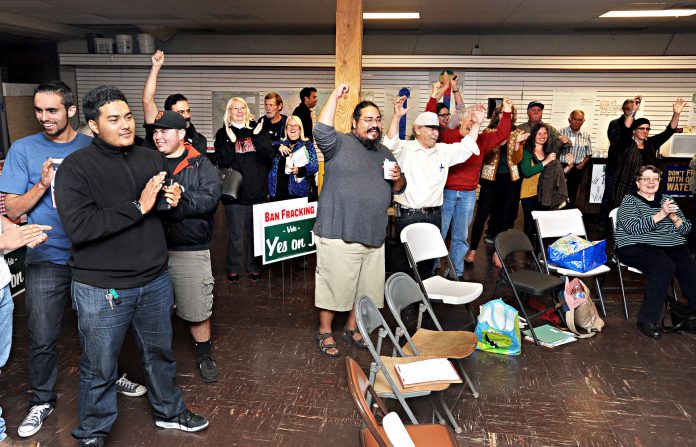
Retired San Benito High School Principal Tim Shellito believes the victory for supporters of Measure J – set to ban all enhanced petroleum extraction countywide – shows that “John Q. Public” is alive.
“It says a lot because it’s a small group of people who went against large sums of money, huge businesses and lawyers,” said Shellito, referring to the nearly $1.9 million in donations through the latest reporting period from big oil companies to the No on Measure J campaign. “John Q. Public is still alive.”
Shellito’s mood resonated throughout the headquarters for the Yes on Measure J campaign stationed downtown in the old Muenzer’s sporting goods location after results came through Tuesday night. Organizers and other supporters were jovial, but also reflected on the significance of the victory and what it means about democracy.
“I think it means that people actually have more power than the biggest corporations,” said one of the lead campaign organizers, Andy Hsia-Coron, “that when you get a community involved in something – that has tremendous force. I think that the millions of dollars spent by the industry was really a sign of their fear more than anything else.”
With 100 percent of precincts counted as of 12:27 a.m. Wednesday, Measure J had 5,021 yes votes to 3,733 no votes – or a 57.36 percent to 42.64 percent margin, according to unofficial results.
Voters’ passage of Measure J means enhanced extraction – such as fracking, cyclic steaming and well acidizing – will be banned or phased out starting Jan. 1, while all petroleum activities will be banned in rural residential zones near Hollister and San Juan Bautista. On a wider scale, Measure J supporters believe the victory in San Benito County – Santa Barbara County voters defeated a similar measure Tuesday – could lead to a domino effect of sorts in other counties.
“It’s a movement,” said Margaret Rebecchi, one of the lead organizers for the yes campaign. “I think oil companies cannot afford for us to win and for them to lose. This is a movement that’s going to spread in California. We’re in a drought. I think we’re going to make people conscious.”
County Supervisor Robert Rivas, on board with Measure J early on in the campaign, underscored the significance of the local electorate’s decision.
“I take pride that we’re the first county in the state to actually tackle this issue,” said Rivas, adding how it showed people can stand up to the “largest special interest in the world.”
Like others in the yes camp, Rivas already anticipates potential litigation from oil interests.
“When that day comes, it’s going to be up to the courts to determine it,” he said. “I’m just really excited and I’m really thrilled the local community came together.”
Rivas said he believed despite tensions between the two campaigns, the yes side “had a great message for the community.” He expressed concern about water contamination, air quality and infrastructure demands.
Larry Rebecchi, one of the other lead organizers in the campaign, also stressed the importance of protecting the local environment.
“We have a national park we want to protect,” he said, referring to Pinnacles National Park, miles from a field where cyclic steaming is proposed. “We have groundwater we want to protect.”
While No on Measure J campaign organizers had remained optimistic early on that results might turn around, they shared their thoughts on the race and its implications.
Kristina Chavez Wyatt, a spokeswoman for the No on Measure J campaign, credited local groups that came out early in opposition of the initiative such as the county cattlemen and cattlewomen groups, and the prior editorial board of the Free Lance.
“They’ve seen through the deception and the tactics from the activists trying to impose this measure on the community,” Chavez Wyatt said.
The lead organizer of the opposition’s campaign, Adam Lawrence, called the yes side’s effort a “great grassroots campaign.”
“If they don’t pass this time, hopefully they will ban fracking in this community because we never endorsed fracking, either,” Lawrence said. “So we have a lot of respect for what they’ve done.”
Look back for more, including reaction from Congressman Sam Farr.









